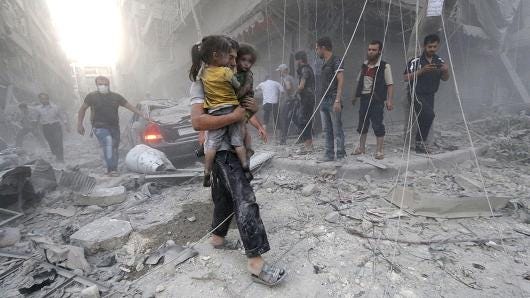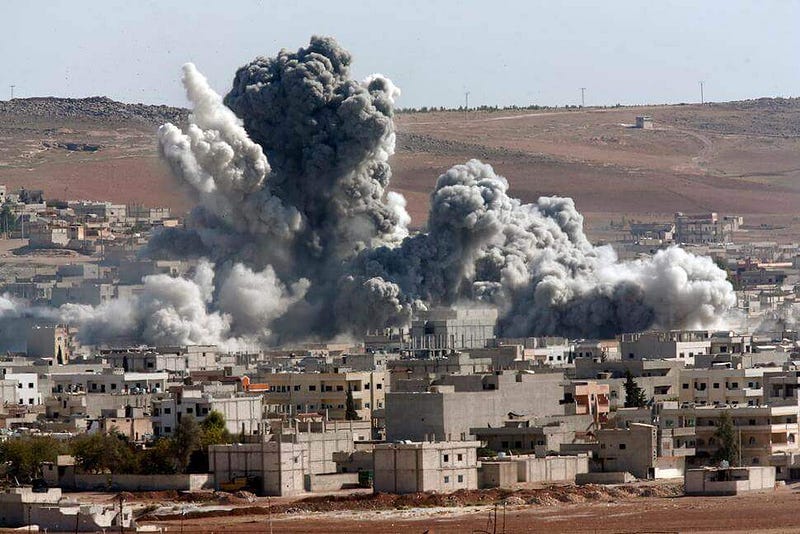By Kent Kroeger (Source: NuQum.com, April 12, 2018)

As inspectors from the Organisation for the Prohibition of Chemical Weapons (OPCW) prepare to go to Syria to investigate the alleged use of chemical weapons in the Syrian city of Douma, the U.S. and its allies are sending mixed messages on what should be the proper response to the chemical attack which left a reported 70 people dead and 500 more injured.
French President Emmanuel Macron says he has proof the Syrian government used chemical weapons in Douma, though nothing has yet been released to the public. At the same time, he insists any response to that attack on civilians must not escalate the Syrian conflict. British PM Theresa May has been similarly conflicted and non-committal on what the proper response should be.
As typical, German chancellor Angela Merkel has been more decisive, ruling out any German participation in any military action in Syria, and emphasizing instead the importance of unity among Western allies.
For his part, U.S. President Donald Trump remains characteristically vague and contradictory about any U.S. response, saying it “could be very soon or not so soon at all.”
As this is happening in the Western capitals, the OPCW announced on Tuesday its plan to investigate the Douma incident: “The OPCW Technical Secretariat has requested the Syrian Arab Republic to make the necessary arrangements for such a deployment. This has coincided with a request from the Syrian Arab Republic and the Russian Federation to investigate the allegations of chemical weapons use in Douma. The team is preparing to deploy to Syria shortly.”

Where is this all heading?
The Russian Defense Ministry says Russia will target any U.S. missiles from their launch point, which is likely to be either the U.S.S. Donald Cook or U.S.S. Porter, two U.S. Navy destroyers already in the Mediterranean.
Andrei Kortunov, head of the Russian International Affairs Council, a state-backed think-tank in Moscow, says a military strike against Syria will only escalate U.S. and Russian tensions while doing little to change the trajectory of the conflict. More ominously, he believes a wider Middle East war is possible if such a retaliatory attack occurs.
“I don’t want to sound apocalyptic — we are not there yet. But we are moving in that direction,” he said earlier in the week.
The U.S. is beyond just ‘moving’ in that direction. In January, the Trump administration decided to permanently separate northeast Syria from the rest of Syria with the intent of keeping Iranian influence out of Syria and keeping the U.S. relevant when a final Syrian settlement is negotiated.
The U.S. plan to train the Syrian Border Security Force (BSF), which will be primarily composed of Kurdish fighters along the Syrian-Turkey border, has already aggravated Turkey, which is engaged in its own internal conflict with Kurdish terrorist groups, such as the Turkish Kurdistan Workers’ Party (PKK).
Should the Trump administration decide to turn its occupation of northeast Syria into a regime change war, the U.S. will need far more than the 2,000 troops already in place in northeast Syria.
But, as we’ve seen from previous U.S. invasions in the Middle East, troop numbers can escalate rapidly once the president gives the order.
From late October 2002, when the U.S. Congress approved military action in Iraq (Authorization for Use of Military Force Against Iraq Resolution of 2002), the U.S. and its allies had 125,000 in Kuwait by mid-March 2003 and would add 100,000 more by late April.
As with the Iraq War in 2003, when the George W. Bush administration accelerated its “marketing campaign” in September 2002 to sell the idea of an Iraq invasion to the American public, the first indication of the Trump administration’s intent to invade Syria may come from the U.S. news media.
Prior to the 2003 Iraq invasion, The New York Times’ Judith Miller penned the first of many disastrously inaccurate stories about Saddam Hussein’s alleged WMD program in December 2001, in what became a coordinated war dance by the national news media by the end of 2002.
We may be seeing this same dynamic starting again, evidenced by the U.S. news media’s coverage of the Douma attack which has been peppered with often blustery calls for the Trump administration to escalate the American military role in Syria.
MSNBC’s Andrea Mitchell (April 8, 2018): “Trump has to take action. What he ought to do is a coordinated action. There has to be a comprehensive response (to the Douma attack).”
MSNBC’s Joe Scarborough (April 8, 2018): “As Trump leaves (Syria) to fight his imaginary border war, he’s leaving the real war where we could make a difference and he’s turning it over to Assad and Iran and ISIS. This is something Barack Obama wouldn’t even do if confronted with these set of facts.”
National Review editorial board (April 11, 2018): “We should get an authorization from Congress for using force in Syria rather than stretching Bush-era authorizations to justify red-line strikes and other operations in the country. One way or the other, the missiles are going to fly. What remains to be seen is if this the beginning of a more robust Syria strategy or a substitute for one.”
The New York Times editorial board (April 11, 2018): “What to do next in Syria is a crucial test for Mr. Trump, who has shirked America’s traditional leadership role. He has tried to seem like a macho leader who would aggressively use American power where President Barack Obama wouldn’t, while talking about pulling out of the Middle East and walking away from international commitments. With such inconstancy, he will not be able to stop the violence in Syria, and with no clear, unified plan with the Western allies, he will only empower Mr. Assad.
The New York Times is all but calling Trump a ‘chicken’ and doing the obligatory wing flap and cackle.
This kabuki dance the U.S. news media does prior to every new U.S.-led war is predictable. The media, for its part, is in the business of attracting audiences and wars do exactly that.
Hopefully, this isn’t the run-up to a much larger U.S. commitment in the Syrian conflict.
I fear, however, it is.
K.R.K.
